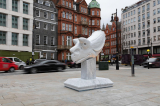
Sinn Fein, the Irish nationalist party and former political wing of the Irish Republican Army, has achieved another significant milestone by comfortably overtaking their
unionist rivals in the recent council elections in Northern Ireland. This victory establishes Sinn Fein as the largest party at the local level for the first time, following their historic triumph in the Northern Ireland Assembly elections last year. Sinn Fein's ultimate goal is to secede from the UK and establish a united Ireland.
The left-wing party has also gained considerable popularity in the Republic of Ireland and currently leads the opinion polls as the nation gears up for the national elections scheduled for 2025.
During the council elections, Sinn Fein experienced a significant increase in their vote share, rising by nearly eight percentage points to reach 31%. Out of the 462 seats available, Sinn Fein secured 137, with 16 yet to be declared. The Democratic Unionist Party (DUP), previously the largest party at the local and regional levels, obtained 118 seats.
Michelle O'Neill, the leader of Sinn Fein in Northern Ireland, proclaimed, "Historic change is happening, and Sinn Fein is leading that change right across Ireland," while urging the DUP to end their 15-month boycott of the regional assembly in response to the desires of voters.
The DUP had viewed these elections as an opportunity to strengthen their demands for additional concessions from the UK regarding Northern Irish post-Brexit trade, which had led to their boycott. They interpreted the election results as a "strong mandate" from the unionist community.
Although the Alliance Party, a cross-community party, made some gains as anticipated, other more moderate nationalist and unionist parties suffered losses due to Sinn Fein's success. The hardline Traditional Unionist Voice, which has been pressuring the DUP on post-Brexit trade checks that many unionists believe undermine their position within the UK, failed to replicate their regional vote surge.
DUP leader Jeffrey Donaldson expressed his hopes for progress in protecting Northern Ireland's place within the United Kingdom, emphasizing the importance of unionists and the DUP's role.
In a notable breakthrough, these elections also marked the first time a Black individual, Lilian Seenoi-Bar, representing the nationalist SDLP, was elected to office in Northern Ireland. Photo by Chris Downer, Wikimedia commons.









































